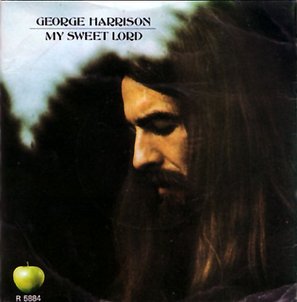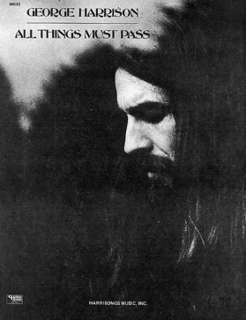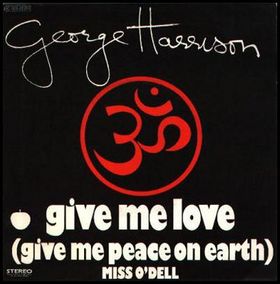
The Concert for Bangladesh was a pair of benefit concerts organised by former Beatles guitarist George Harrison and Indian sitar player Ravi Shankar. The shows were held at 2:30 and 8:00 pm on Sunday, 1 August 1971, at Madison Square Garden in New York City, to raise international awareness of, and fund relief for refugees from East Pakistan, following the Bangladesh Liberation War-related genocide. The concerts were followed by a bestselling live album, a boxed three-record set, and Apple Films' concert documentary, which opened in cinemas in the spring of 1972.

William Everett Preston was an American musician, whose work encompassed R&B, rock, soul, funk, and gospel. Preston was a top session keyboardist in the 1960s, during which he backed artists such as Little Richard, Sam Cooke, Ray Charles, the Everly Brothers, Reverend James Cleveland, the Beatles and the Rolling Stones. He went on to achieve fame as a solo artist with hit singles such as "That's the Way God Planned It", the Grammy-winning "Outa-Space", "Will It Go Round in Circles", "Space Race", "Nothing from Nothing", and "With You I'm Born Again". Additionally, Preston co-wrote "You Are So Beautiful", which became a #5 hit for Joe Cocker.

"My Sweet Lord" is a song by English musician George Harrison, released in November 1970 on his triple album All Things Must Pass. It was also released as a single, Harrison's first as a solo artist, and topped charts worldwide; it was the biggest-selling single of 1971 in the UK. In America and Britain, the song was the first number-one single by an ex-Beatle. Harrison originally gave the song to his fellow Apple Records artist Billy Preston to record; this version, which Harrison co-produced, appeared on Preston's Encouraging Words album in September 1970.

"All Things Must Pass" is a song by English rock musician George Harrison, issued in November 1970 as the title track to his triple album of the same name. Billy Preston released the song originally – as "All Things (Must) Pass" – on his Apple Records album Encouraging Words (1970) after the Beatles had rehearsed the song in January 1969 but overlooked it for inclusion on their Let It Be album. The composition reflects the influence of the Band's sound and communal music-making on Harrison, after he had spent time with the group in Woodstock, New York, in late 1968. In his lyrics, Harrison drew inspiration from Timothy Leary's poem "All Things Pass", a psychedelic adaptation of the Tao Te Ching.

The Concert for Bangladesh is a live triple album credited to "George Harrison & Friends" and released on Apple Records in December 1971 in America and January 1972 in Britain. The album followed the two concerts of the same name, held on 1 August 1971 at New York's Madison Square Garden, featuring Harrison, Bob Dylan, Ravi Shankar, Ali Akbar Khan, Ringo Starr, Billy Preston, Leon Russell and Eric Clapton. The shows were a pioneering charity event, in aid of the homeless Bengali refugees of the Bangladesh Liberation War, and set the model for future multi-artist rock benefits such as Live Aid (1985) and the Concert for New York City (2001). The event brought Harrison and Starr together on a concert stage for the first time since 1966, when the Beatles retired from live performance, and represented Dylan's first major concert appearance in the US in five years.

Encouraging Words is the fifth studio album by American soul musician Billy Preston, released in September 1970 on Apple Records. It was the last of Preston's two albums for the Beatles' Apple label, after which he moved to A&M Records. The album was co-produced by George Harrison and Preston. Harrison's songs "All Things Must Pass" and "My Sweet Lord" were issued here for the first time, two months before his own recordings appeared on his triple album All Things Must Pass.

I Wrote a Simple Song is the sixth studio album by American soul musician Billy Preston. Released in November 1971, it was his first album for A&M Records and marked the start of a run of commercial success in the United States that lasted through to the late 1970s. The album includes the hit single "Outa-Space", which won the Grammy Award for Best Pop Instrumental Performance of 1972. Preston included a live version of the instrumental "The Bus", as part of a medley with the Beatles' "Day Tripper", on his 1974 album Live European Tour.

Music Is My Life is the seventh studio album by Billy Preston, released in 1972. The album contains Preston's first number 1 single, "Will It Go Round in Circles", and a cover of the Beatles' song "Blackbird". It is also the first of his albums to feature his future A&M Records label-mates the Brothers Johnson. Another track, "God Loves You", was issued on a single as the B-side of "Slaughter", Preston's theme song for the 1972 film of the same name.

"What Is Life" is a song by English rock musician George Harrison from his 1970 triple album All Things Must Pass. In many countries, it was issued as the second single from the album, in February 1971, becoming a top-ten hit in the United States, Canada and elsewhere, and topping singles charts in Australia and Switzerland. In the United Kingdom, "What Is Life" appeared as the B-side to "My Sweet Lord", which was the best-selling single there of 1971. Harrison's backing musicians on the song include Eric Clapton and the entire Delaney & Bonnie and Friends band, with whom he had toured during the final months of the Beatles. Harrison co-produced the recording with Phil Spector, whose Wall of Sound production also employed a prominent string arrangement by John Barham and multiple acoustic rhythm guitars, played by Harrison's fellow Apple Records signings Badfinger.

"Give Me Love " is a song by English musician George Harrison, released as the opening track of his 1973 album Living in the Material World. It was also issued as the album's lead single, in May that year, and became Harrison's second US number 1, after "My Sweet Lord". In doing so, the song pushed Paul McCartney and Wings' "My Love" from the top of the Billboard Hot 100, marking the only occasion that two former Beatles have held the top two chart positions in America. The single also reached the top ten in Britain, Canada, Australia and other countries around the world.

"If Not for You" is a song by American singer-songwriter Bob Dylan from his October 1970 album New Morning. It was also issued as the A-side of a single in Europe in early 1971. The song is a love song to Dylan's first wife, Sara Dylan. He recorded it several times in 1970; the session for the released version took place in New York in August. He also recorded the song with George Harrison on May 1, soon after the break-up of the Beatles, a session that attracted much speculation in the music press. The May recording remained unreleased until its inclusion on The Bootleg Series Volumes 1–3 in 1991.

"Outa-Space" is an instrumental recorded by Billy Preston that originally appeared on his 1971 A&M Records-debut album, I Wrote a Simple Song. To create the primary instrumental sound, Preston played a clavinet through a wah wah pedal. The song was created by Preston improvising while calling out chord changes to the backing band. He later added organ and hand claps. Preston named the song "Outa-Space" for the instrumental's spacy sound.
"Hear Me Lord" is a song by English rock musician George Harrison from his 1970 triple album All Things Must Pass. It was the last track on side four of the original LP format and is generally viewed as the closing song on the album, disc three being the largely instrumental Apple Jam. Harrison wrote "Hear Me Lord" in January 1969 while still a member of the Beatles. The band rehearsed it briefly at Twickenham Film Studios that month, but it was passed over for inclusion on what became their final album, Let It Be.

"Deep Blue" is a song by English rock musician George Harrison that was released as the B-side to his 1971 charity single "Bangla Desh". Harrison wrote the song in 1970, midway through the recording sessions for All Things Must Pass, and recorded it in Los Angeles the following year while organising the Concert for Bangladesh. The composition was inspired by the deteriorating condition of his mother, Louise, before she succumbed to cancer in July 1970, and by Harrison's feelings of helplessness as he visited her in hospital in the north of England. Given the subject matter, "Deep Blue" also served to convey the suffering endured by the millions of refugees from war-torn Bangladesh in 1971, as sickness and disease became widespread among their makeshift camps in northern India.

The Concert for Bangladesh is a film directed by Saul Swimmer and released in 1972. The film documents the two benefit concerts that were organised by George Harrison and Ravi Shankar to raise funds for refugees of the Bangladesh Liberation War, and were held on Sunday, 1 August 1971 at Madison Square Garden in New York City. As well as notable performances from Harrison and Shankar, the film includes "main performer" contributions from Harrison's fellow ex-Beatle Ringo Starr, Billy Preston and Leon Russell, and a surprise walk-on from Bob Dylan. Other contributing musicians include Ali Akbar Khan, Eric Clapton, the band Badfinger, Klaus Voormann, Jesse Ed Davis, Jim Horn and Jim Keltner.
"Sing One for the Lord" is a song by American soul musician Billy Preston that was released in September 1970 on his Apple Records album Encouraging Words. It was written by George Harrison and Preston. Although the pair frequently collaborated as recording artists from 1969 onwards, it is their only formal songwriting collaboration. The song is in the gospel style and was written in praise of the two musicians' respective deities.

"That's the Way God Planned It" is a song by American musician Billy Preston and the title track to his 1969 album of the same name. Issued as a single, the song was Preston's first release on the Beatles' Apple record label, following his guest role on the band's "Get Back" single. The lyrics to "That's the Way God Planned It" partly reflect the long musical apprenticeship Preston had served since childhood, mentored by artists such as Sam Cooke and Ray Charles, while musically the track combines the gospel tradition with rock. Produced by George Harrison in London, the recording also features contributions from Eric Clapton, Keith Richards, Ginger Baker and Doris Troy. Having been edited down to three minutes for its single release, the full version appeared on the album, as "That's the Way God Planned It ".

"All That I've Got " is a song by American soul musician Billy Preston that was released in January 1970 as his third single on Apple Records. It was written by Preston and his fellow Apple artist Doris Troy and produced by George Harrison. In the United States, the single missed the Billboard Hot 100 chart, peaking at number 108. According to Harrison, the song was Preston's musical response to criticism that he had abandoned his black soul roots by embracing rock music.

George Harrison and Ravi Shankar's 1974 North American tour was a 45-show concert tour of the United States and Canada, undertaken by English musician George Harrison and Indian sitarist Ravi Shankar in November and December 1974. It is often referred to as the Dark Horse Tour, since the concerts served as a launch for Harrison's record label Dark Horse Records, to which Shankar was one of the inaugural signings, and Harrison's concurrent single was the song "Dark Horse". The release of his delayed album, also titled Dark Horse, followed towards the end of the tour. The shows featured guest spots by Harrison's band members Billy Preston and Tom Scott.
Joe Greene is an American gospel and soul singer and songwriter. A male soprano, he was especially active in the late 1960s and the 1970s as a backing vocalist for rock artists seeking to achieve a more polished vocal performance on their recordings. As a songwriter during that time, he frequently collaborated with Billy Preston, co-writing the latter's Grammy-winning 1972 hit "Outa-Space" and other songs.

















